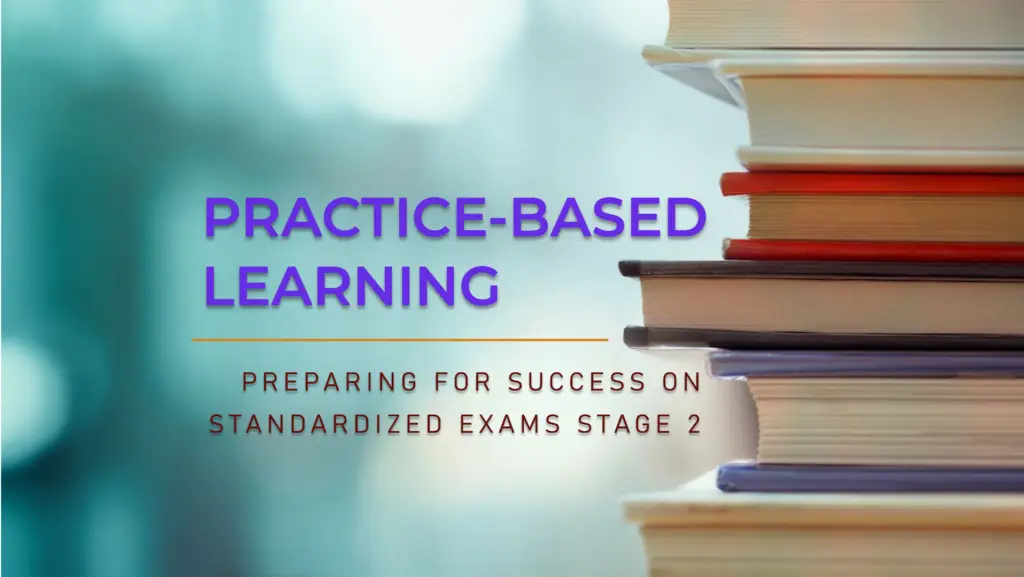
Practice-Based Learning: Preparing for Success on Standardized Exams Stage 2 of 4
Few things in an academic’s life cause as much trepidation and self-doubt as a high-stakes standardized exam. In Stage 1 – Capturing Core Concepts, I went over how to build a solid foundation of knowledge and framework of interrelated ideas. However, knowledge alone isn’t enough to ensure success.
As you work your way up the rungs of the academic ladder, the exams become increasingly challenging by skewing away from knowledge-based questions and towards reasoning-based questions. Successfully navigating these exams oftentimes requires applying the knowledge you’ve gained to novel situations.
This is a skill unto itself that needs practice to be honed, and the focus of our second stage.
Stage 2 – Practice-Based Learning
The first key to successfully utilizing practice-based learning is unlearning: let go of the concept that you learn everything you need from studying books and watching videos, then take quizzes to assess your knowledge.
Your first mission: realign your expectations on what “successful” practice means.
It’s not your fault. We’re raised to study, THEN take the test. For many seeking graduate-level education, especially those aspiring to be physicians, we’re used to acing those tests and seeing 90% or higher almost every time. In fact, exams like the MCAT and USMLE Step 1 are taken almost exclusively by students that grew up getting straight-A’s with the occasional B.
But here’s the thing…
In order for standardized exams to differentiate students across a wide-range of levels, they need to create a bell curve. When creating an exam to fit to a bell curve, the goal is for the average test taker (on their official exam) to score as close to 70% as possible.
With this premise in mind, when you first begin your journey through a question bank with several thousand practice questions, where you should expect your scores to fall? Certainly not better than you will do on Test Day, and more than likely not better than the average test taker who already put in several hundred more hours of prep. Therefore, scores in 60’s, 50’s, and even the 40’s are to be expected given the difficult nature of the exams. This is OK.
Your best study sessions are not going to be the ones where you get the highest quiz scores, but rather the ones where you learn the most. This requires leaning into the discomfort of more challenging topics and concepts, pushing yourself to work through questions where the answers don’t come easily. When I have a student start scoring in the 90’s on a given topic, I light-heartedly tell them to quit patting themselves on the back and move on to something they find tougher.
Now, let’s return to the “learning” aspect of practice-based learning. This requires a new understanding of your practice quizzes as not only being assessments, but learning opportunities. This is best done by adopting a methodical approach to practice questions, focused on identifying key information and applying your baseline knowledge to extrapolate the answer. Then, upon completion of the quiz, spend at least as much time reviewing the answers as you spent taking the test.
Your second mission: compare the logical path outlined in each answer’s explanation to your question approach, identifying where you were on track and where you went astray.
In doing so, you’ll simultaneously reinforce what you correctly knew as well as discover the boundaries of what you need to explore further. Look for patterns across question sets to see where to best revisit topics. When determining next steps, consider whether you would benefit more from targeted review of a given topic or from answering additional practice questions.
I typically encourage my students to begin with 40 practice questions a day, scaling up over time as they become more efficient with both their test-taking and review. However, I don’t push them beyond 80 questions a day until we move to Stage 3 – Pacing & Endurance.
On a final note, focus on method over timing during this period. In other words, learn to do it the right way first and allow your efficiency to improve with time rather than looking for the fastest way to answer questions now. This will lead to strategies that ultimately cap your long-term success. Try not to stress the trend of your scores from day-to-day, especially as you change between topics. Trust that success will come with time and you’re on your own track.
